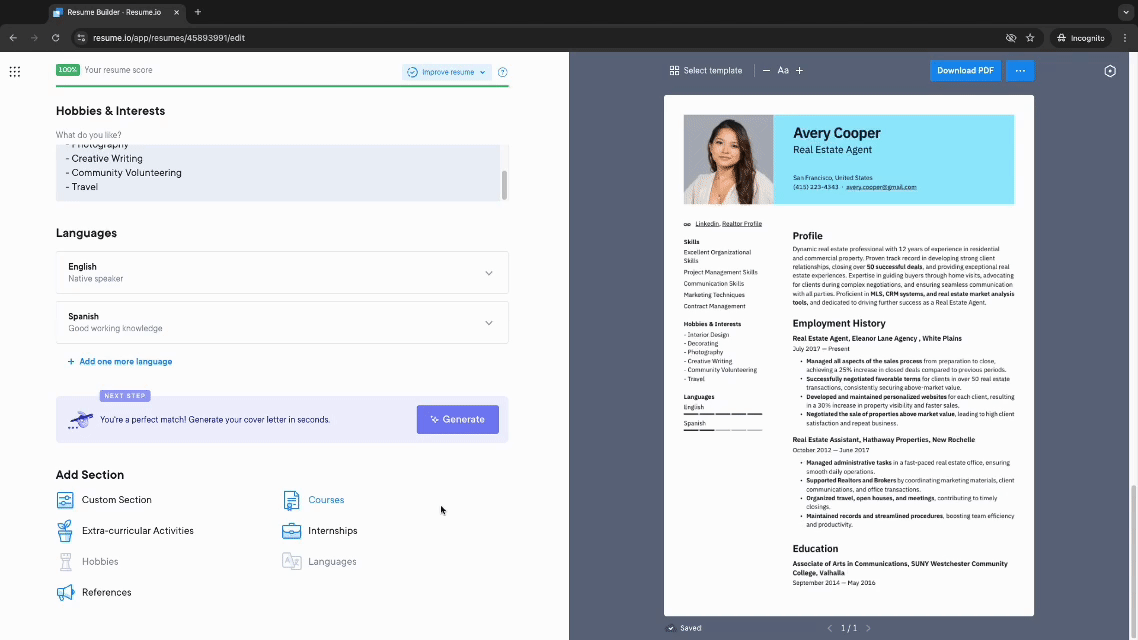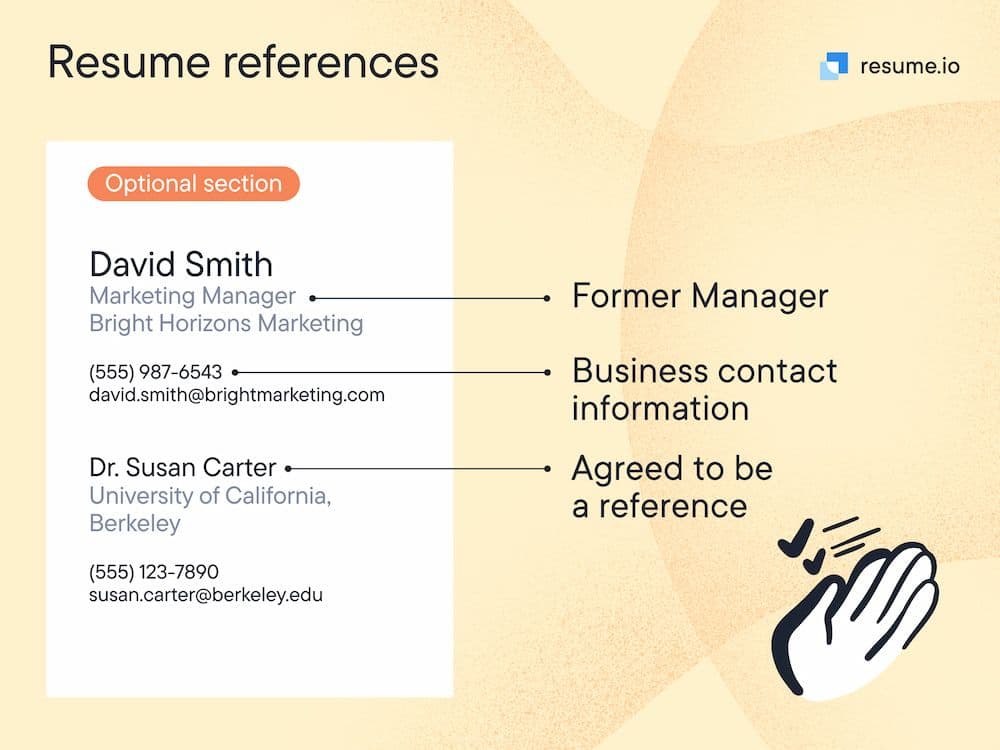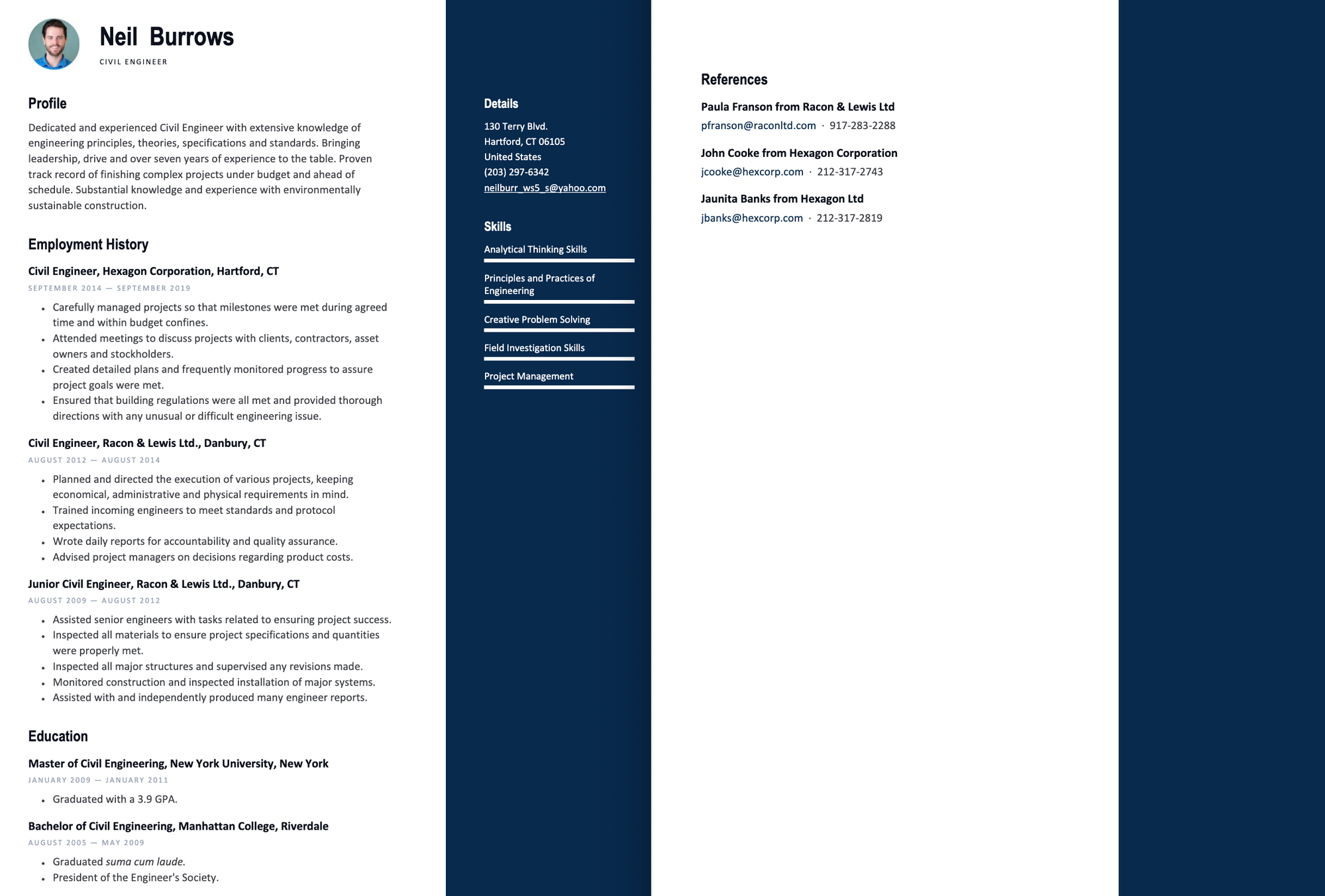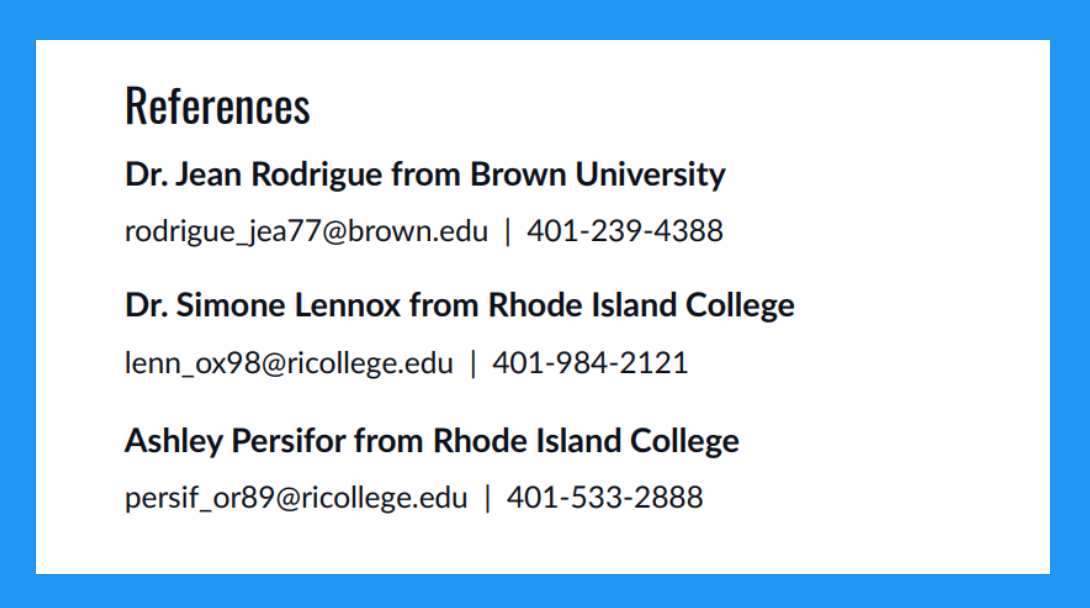It used to be standard to include references on your resume—but times have changed. These days, it’s best to leave this information off of your resume, except in specific circumstances.
In this article, we’ll show you when and how to list references on your resume for prospective employers.
Should you put references on a resume?
No, you should not list references on your resume. While it used to be a common practice, including resume references has become outdated.
You have limited space on a resume to sell your skills and convince a hiring manager to contact you for an interview. Including references takes up valuable space that you can otherwise use to describe your experience, achievements, and additional qualifications. For expert help crafting a standout resume, consider using an ai resume writer to tailor your content perfectly for your target job.
There’s one exception to this rule, however. If an employer specifically asks you to include references on your resume, make sure you do so to follow their requirements.
Who should you put as a reference?
Think carefully about who you want to use as professional references. They should be people who are familiar with your skills, performance, and work ethic. Ideally, the references you choose should also be able to speak positively about your ability to succeed in the new role.
Here are some potential resume references to consider:
- Former or current supervisors
- Colleagues or coworkers
- Mentors or advisors
- Clients or business partners
- Professors or teachers
- Faculty advisors
If you’re a student or recent graduate applying for your first job, you can also include personal references, such as sports coaches or guidance counselors. However, you should never list your friends or family as resume references. While they may have nice things to say about you, it’s unprofessional to use them for references.
Always ask references for permission
Never use someone as a reference without asking for their permission first. If they are blindsided by an employer’s call or email, it can make you look unprofessional. And of course, don’t forget to thank your references for their time and support!
What are the reasons for not including references on a resume?
These are a few good reasons to leave references off your resume:
- Employers aren’t expecting them. Hiring managers review resumes early in the hiring process. Typically, they won’t request your references until much later, when they’re close to making a hiring decision.
- It’s not ATS-friendly. Applicant tracking system (ATS) software may be unable to scan your resume properly if it contains nonessential information, including references.
- References contain sensitive information. If you post your resume on LinkedIn or job search websites, your references’ private information may become publicly accessible.
For more tips, check out our article on common resume mistakes and how to avoid them.
How to list references on a resume

If you’re applying for a job where the employer has requested references on your resume, include them on a separate page. This approach appears more professional than trying to cram your references onto your one-page resume.
When listing your references, include these details for each person:
- First and last name
- Job title
- Company name
- Email address
- Phone number
- Relationship to you

Aim to include three to five resume references who can vouch for you professionally. List your best references at the top. That way, if an employer only makes it through part of your list, they’ll at least speak with the people who will give you the best recommendations.
Reference page for resume template

When creating a list of references, follow the same structure as when writing your resume and cover letter. Include a header with your name and contact information. Below the header, provide a list of references with the required information an employer needs to contact them.
Here’s a copyable example you can follow to create a reference page for your resume:
[Name]
[Phone number], [Email], [LinkedIn]
Reference list
[Reference Name 1]
[Job Title + Company Name]
[Phone number]
[Email]
[Connection to you]
[Reference Name 2]
[Job Title + Company Name]
[Phone number]
[Email]
[Connection to you]
[Reference Name 3]
[Job Title + Company Name]
[Phone number]
[Email]
[Connection to you]
Examples of resume references

Check out these examples of resume references for people in different stages of their careers:
References for a student resume
Dr. Emily Carter
Professor of Business Administration, Springfield College
(555) 394-1739
emily_carter@email.com
Academic adviser
Michael Johnson
Marketing Manager, Brightside Marketing
(555) 104-3841
mjohnson@email.com
Internship supervisor
Sarah Williams
Volunteer Coordinator, Springfield Community Center
(555) 947-3914
s_williams@email.com
Volunteer supervisor
References for a teacher resume
Linda Matthews
Principal, Rivertown Elementary School
(555) 113-4010
linda_matthews@email.com
Direct supervisor
Daniel Lewis
Fifth Grade Teacher, Rivertown Elementary School
(555) 483-1947
daniel_lewis@email.com
Colleague
Rachel Adams
Retired educator
(555) 147-3947
rachel.adams@email.com
Mentor
References for a manager resume
James Turner
Director of Operations, Lakeside Retail
(555) 473-1749
j.turner@email.com
Direct supervisor
Olivia Grant
Sales Department Manager, Lakeside Retail
(555) 394-1235
o.grant@email.com
Colleague
Chris Daniels
Regional Buyer, Summit Gear
(555) 304-1730
chrisdaniels@email.com
Longtime client and business partner
Resume references FAQs
Here are answers to other frequently asked questions about when and how to list references on a resume:
Should I say “References available upon request”?
No, there’s no need to include this phrase anywhere on your resume. Employers will already assume that you have references available upon request. Putting this phrase on your resume will just take up space without adding value.
Read more in our article on what not to put on a resume.
Should I include references if my resume is too short?
No, do not include references just to pad a short resume. If you’re applying for your first job or making a career change, beef up your resume with your transferable skills, academic achievements, internships, or volunteer work.
Can I use personal references instead of professional references for a resume?
Generally, you should use professional references when applying for jobs.
However, if you don’t have sufficient work experience, it’s fine to include personal references, such as a coach, youth leader, or counselor. Make sure these references can still speak to your work ethic, responsibility, and soft skills.





